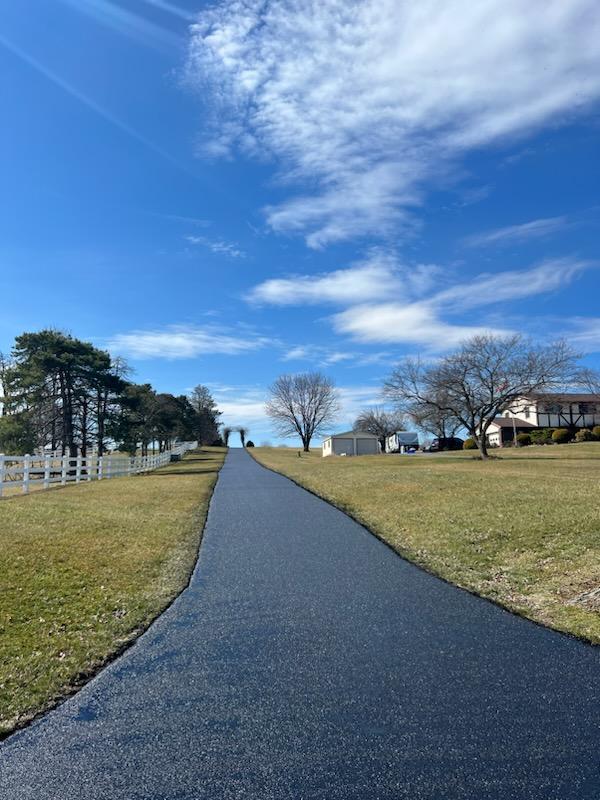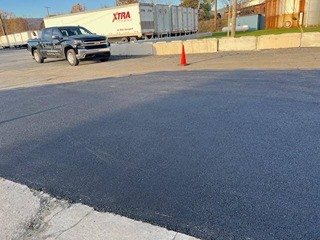Understanding The Asphalt Driveway Cost: Factors And Estimates
Asphalt driveways provide a strong, durable and cost-effective solution for many residential and commercial properties.
Understanding the cost of an asphalt driveway is important for property owners to make informed decisions about their paving needs.
This article will outline the various factors that influence the cost of an asphalt driveway as well as provide estimates for potential projects.
The scope and complexity of each project will be different, but there are some common elements that contractors take into account when providing estimates.
Factors such as materials, labor, soil preparation, grading and drainage all play a role in determining the final cost of a new asphalt driveway.
By understanding these factors, property owners can make informed decisions that best fit their budget and project requirements.

Materials Used
A popular theory in the asphalt paving industry is that driveway costs are primarily determined by the materials used. While this notion does have some truth to it, there are many other factors to consider when estimating the total cost of a driveway project. Asphalt paving contractors must carefully assess numerous variables such as labor costs, job site conditions, and geographical location in order to accurately calculate an estimate for a customer.
In terms of material costs, asphalt driveways require two primary supplies: aggregate base and hot mix asphalt. Aggregate base is composed of crushed rock or gravel used as a foundation for the pavement and acts as structural support for the asphalt layer. Hot mix asphalt is a blend of stones, sand, and liquid asphalt cement applied on top of aggregate base and serves as the waterproofing layer. The thickness of both layers depends on the condition of soil beneath them and can range from 4-10 inches thick.
Furthermore, additional supplies may be needed depending on the project such as fabric reinforcement or sealants which may also add to material costs.
Assessing material costs requires knowledge about local market prices for supplies such as aggregate base and hot mix asphalt plus any additional items needed for the project. An experienced contractor can use their expertise to obtain competitive rates from suppliers which will ultimately contribute to lower customer price points.
With these considerations in mind, customers can rest assured that their driveway project will be constructed with quality materials at an affordable rate.
Labor Costs
Labor costs for asphalt driveway installation typically depend on the scope and complexity of the project. Asphalt paving contractors will assess the size and location of the driveway, as well as any unique features that may require additional labor to prepare the site and install the asphalt.
This includes excavation, grading, drainage, sub-base preparation and installation, surface preparation, asphalt application and compaction. The cost of labor can vary widely depending on the contractor’s experience level, local market conditions, and whether or not specialty equipment is needed.
The cost of labor also depends on whether existing materials will be salvaged or disposed of prior to installation. In some cases it may be more economical to use existing materials such as soil or gravel if it meets certain standards for use in an asphalt driveway. If a complete removal is necessary then disposal fees may need to be factored into the total cost of labor.
In order for a quality asphalt driveway to be constructed, it is essential that all areas affected by the installation are prepped correctly. This often involves soil preparation which entails ensuring proper drainage and grading before applying asphalt material overtop.
Taking these steps ensures that your asphalt driveway is built correctly from beginning to end and will last for many years with minimal maintenance needs. To ensure a quality job, soil preparation is an important part of any asphalt driveway installation process.
Transitioning into soil preparation allows us to move closer towards completing the project with confidence.
Soil Preparation
The thought of laying asphalt can often seem like a daunting task, but with the right preparation, it can be done easily. Soil preparation is an essential part of laying down a solid foundation for your asphalt driveway. By taking the time to properly prepare your soil, you will be rewarded with a smooth and sturdy surface that will last for years to come.
For soil preparation, you must first make sure to remove any debris or large objects from the ground.
Additionally, if there are any areas of standing water, they must be filled in with gravel or other materials in order to ensure that the asphalt does not crack and break down over time due to moisture.
It is also important to make sure that the ground is level and compacted before beginning the process of installing the asphalt. By using a roller or hand tampers, you can help achieve this goal.
Finally, it is important to test the pH levels of the soil before applying any asphalt material. If the pH level is too low or high, it could cause damage to your driveway and should be addressed before continuing any further work on it.
With these steps taken care of, you can now move onto grading and drainage – two equally important components when it comes to creating a long-lasting asphalt driveway.

Grading And Drainage
Once the soil preparation is complete, it is time to move onto the grading and drainage of the asphalt driveway. Grading and drainage are important for ensuring the longevity of an asphalt driveway. Proper grading will ensure that the surface stays level, preventing water from pooling in certain areas and causing erosion. Drainage will help reduce water accumulation on the driveway, minimizing damage caused by winter ice and snow.
Here are 3 tips for proper grading and drainage:
1. Make sure to grade away from structures such as garages or homes
2. Install a durable catch basin system to collect water runoff
3. Use low-lying areas to direct rainwater away from your driveway
For best results, consider hiring an experienced asphalt paving contractor who can provide professional advice on proper grading and drainage techniques.
Taking these steps now can save you money in repairs later on down the road. With this groundwork in place, the next step is to look at project scope and complexity when considering cost estimates for your asphalt driveway project.
Project Scope And Complexity
Asphalt paving can be an expensive project, and there are many factors that can affect the cost of the driveway. It is important to look at more than just the price tag when considering a job of this size and complexity.
There are considerations such as labor costs, materials and environmental conditions that will impact the overall cost of the project. When it comes to asphalt paving, one should not simply shop for the lowest quote.
The quality of materials used and expertise of labor may vary between contractors, so it is important to do some research into what you are getting for your money. A reputable contractor with experience in asphalt paving will be able to provide an estimate that takes all factors into account, providing assurance that you are getting what you pay for.
For an accurate estimate on asphalt driveway costs, it is best to get a professional assessment from an experienced contractor who can factor in all elements of the project including labor costs, materials and environmental conditions. This way you can be sure to get a reliable job done right the first time around.
Conclusion
Asphalt driveways are a great investment for any property. They last for many years, providing an attractive and durable driving surface that is easy to maintain. With proper maintenance and care, asphalt driveways can last for decades without requiring expensive repairs or replacement.
The cost of installing an asphalt driveway will vary depending on the size of the project and other factors, but with smart planning and budgeting, homeowners can get the best value for their money. All in all, an asphalt driveway is a smart choice that provides both beauty and practicality – a timeless allusion to quality craftsmanship at home.
How Long Will An Asphalt Driveway Typically Last?
Factors such as location, weather conditions, and quality of installation will affect the lifespan of the asphalt drive.
To ensure your driveway lasts its full lifespan it is important to sealcoat it every two or three years to protect it from moisture damage and UV rays.
Regular maintenance such as filling cracks can also help extend the life of your driveway.
What Should Be Done To Ensure The Longevity Of An Asphalt Driveway?
To ensure the longevity of an asphalt driveway, regular sealcoating should be applied every few years. Sealcoating helps protect the surface from damaging ultraviolet rays, as well as prevents water and ice damage.
Additionally, it is important to fill in any cracks or holes that may occur over time to prevent further damage to the surface.
Lastly, keeping up on regular maintenance such as cleaning debris and leaves off of the surface will help maintain a clean look and keep the driveway in good condition for many years.
Asphalt paving contractors can provide further advice on how best to care for an existing asphalt driveway.
Are There Any Maintenance Tips To Help Extend The Life Of An Asphalt Driveway?
It is important to inspect the driveway for cracks or holes, and repair any that are found.
Sealcoating should also be done every two to three years, to protect the asphalt from the elements and help prevent cracking or crumbling.
Additionally, it is important to keep the driveway clear of debris; sweeping regularly can help maintain the surface.
Finally, make sure that any heavy objects are not placed on top of the driveway, as this can cause damage over time.
Is There Any Way To Reduce The Cost Of An Asphalt Driveway Project?
For starters, homeowners can prepare the area for paving by removing any vegetation from the space and deciding on their desired driveway width. Additionally, they can consider using recycled asphalt or concrete, which is significantly cheaper than buying new materials. Furthermore, opting for a simple design with fewer features such as curbs or edging will also help to keep costs down.
Ultimately, careful planning and research can drastically reduce the cost of an asphalt driveway project without sacrificing quality.
What Are The Environmental Impacts Of Installing An Asphalt Driveway?
Asphalt paving has been associated with air and water pollution, depending on the materials used in the process. The emissions from asphalt production and installation can release hazardous chemicals into the air, while runoff from asphalt paving may contain pollutants that could contaminate nearby water sources.
To reduce these risks, it is important to hire an experienced asphalt contractor who follows industry standards for reducing emissions and preventing runoff. Additionally, recycled materials can be used in place of new materials to minimize environmental impacts.